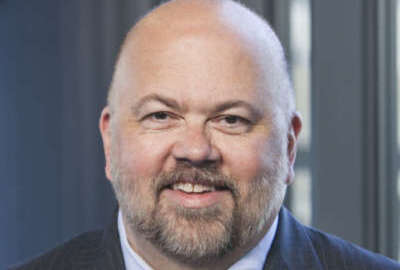Schedule F: A sword with two edges
In theory, a Biden administration could, for its own purposes, use the Trump executive order.
Toast is better when the butter has a chance to soak in. That’s why new presidential administrations set about putting their kind of people in the “plum book” positions. While the paint dries in the Oval Office, the new prez wants to ensure his policy positions get carried out. The deeper in they can melt the butter, the more thoroughly the party can work its political will.
That fact of government life puts stress on the standing, career workforce. It’s also part of a compact that also brings certain protections to career job holders.
Which brings me to the now-infamous executive order that, in essence, turns certain career jobs to political, at-will appointments. If I were Joe Biden, I’d be thinking, if I get in, this Schedule F might be a very useful tool to have. It would, by some estimates, turn the plum book into a plum library.
Like the filibuster in the Senate which was greatly trimmed back for judicial appointments when Democrat Harry Reid was majority leader, the Republicans, you could argue, have been the principal beneficiaries so far in terms of judges appointed by the Trump administration. Notwithstanding Chief Justice John Roberts scolding that there are no “Obama” or “Trump” judges.
The point is, from a political standpoint, these knives have serrated edges that can rip both ways.
Reaction to the executive order has been predictable. It’s been called an assault, insidious, a massive black hole in civil service, a massive undermining, and worse. Judging from the reactions, the order is like a bacterium around which all the usual white blood cells have swarmed.
Our friend Jeff Neal wrote last week, “An effective government needs professionals who understand the work and the mission, and who are not driven solely by the political interests of an administration.” Indeed it does. But those government professionals are ultimately driven by the political interests of a given administration, which in turn are driven by the electorate. For that matter, the career workforce is also driven by whatever Congress determines shall be law. This all gets complicated by the way Congress leaves to the executive branch the details of carrying out law.
For example, the EPA regulations on methane have a legal basis, but not a specific prescription. A strong regulation regarding methane leaks imposed by the Obama administration was rescinded by the Trump administration. Which one was right? These questions, despite everyone invoking science, are ultimately political. If you allowed unmitigated leaks of methane, clearly that would unacceptably pollute. If you try to eliminate methane leaks completely, a crucial industry would have unacceptably bad economic consequences. So administrations put markers somewhere on the spectrum according to calculations that are ultimately political. They are and ought to be informed by science and engineering, but they are ultimately political. The doing, undoing, and redoing proceeds ceaselessly as administrations come and go.
The EPA might be the most exquisite example of this kind of push and pull. Electric generating plant stack output, how many parts per million of this or that should be in the water — like it or not, each administration sets these figures at least partly according to a political calculus. This is also true in nearly every other matter, from Title IX policy of the Education Department to treatment of alternative trading systems by the Securities and Exchange Commission.
Often there is disagreement with the political decision within the career ranks. This leads to a basic but subtle question I think all of the reflexive reaction is missing. Namely, can every civil servant who swears an oath to the Constitution also carry out the policy of a given administration with professional rigor and without mental reservation?
History shows that most do, a few don’t. Apparently the Trump administration has concluded that too many don’t. Actually, not “apparently.” The order says so explicitly: “Senior agency officials report that poor performance by career employees in policy-relevant positions has resulted in long delays and substandard-quality work for important agency projects, such as drafting and issuing regulations.”
The administration doesn’t give any examples. Only the naïve would think a large bureaucracy lacks the means to ensnare a policy change in slowdown gauze. Yet only the most cynical would conclude the standing workforce is essentially beholden to one but its own judgement. I imagine many career federal managers thinking they could end up like, say, U.S. attorneys, which presidents regularly fire en masse.
If an agency political head, in any administration, decides a particular policy, a career staff of rule writers are obligated to write the rules or otherwise carry out the policy, consistent with well-established law and administrative procedures. And to do so with reasonable alacrity. If a career person believes this would violate some statutory, ethical or moral principal — well the choices are not easy. He or she could resign, become a whistleblower, or seek reassignment.
We’ve all been through this situation. I recall early in my career facing the need to implement a boss’s decision that I knew was unethical and ultimately bad business. He wasn’t an evil person, just overly zealous about the success of a new venture. While I formulated a response, his own colleagues and his boss convinced him of his error. But it doesn’t always turn out that way.
My best advice for agency heads who have to come up with potential Schedule F positions is to use the narrowest definition possible. At least it keeps the numbers small. Especially if they think the knife they’re sharpening could end up in the hands of Biden administration appointees. The Office of Personnel Management issued guidance Friday that doesn’t clarify things much. It says there’s no clear legal definition of the jobs named in the EO and, basically, jobs named in the EO’s section 5 may or may not end up as Schedule F.
But OPM does state this, near the bottom: “To ensure placement into Schedule F satisfies procedural due process, the individualized characteristics and attributes of the particular employee encumbering a position are irrelevant to whether the underlying position or office itself is appropriately categorized into Schedule F.” That is, it’s not about you in particular, Sally or Fred. OPM cites a 1915 Supreme Court case about whether every individual affected by some proposed change has the right to be heard. The Court said, “Where a rule of conduct applies to more than a few people it is impracticable that every one should have a direct voice in its adoption.”
What specifically prompted this executive order we don’t really know. Whether it produces a needed, practical way to speed up government or an erosion of civil service, it’s too early to say. For sure it needs more debate.
Copyright © 2025 Federal News Network. All rights reserved. This website is not intended for users located within the European Economic Area.
Tom Temin is host of the Federal Drive and has been providing insight on federal technology and management issues for more than 30 years.
Follow @tteminWFED






